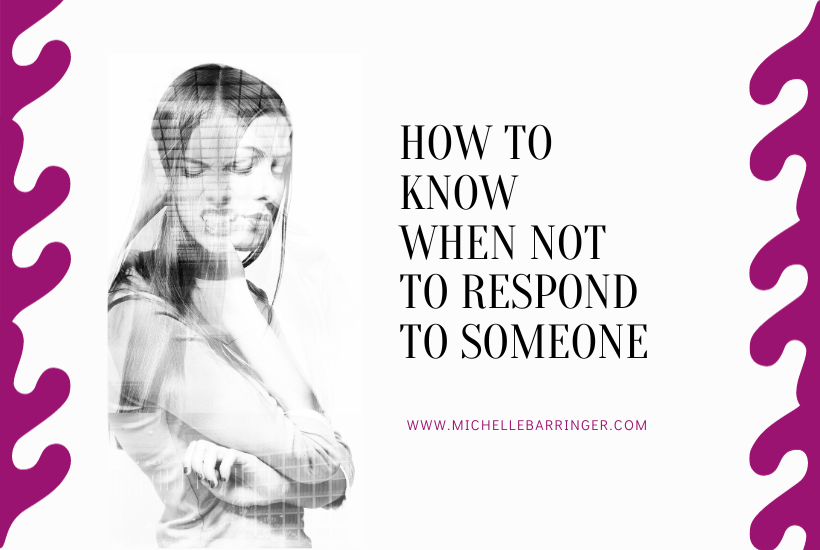Today’s post is a little fiery. Maybe you’ve experienced what I experienced today. If you have, then you may want to know how to know when not to respond to someone.


Fan the Flame
On this twenty-ninth day of this November New Challenge, I woke with peace. Peace traveled with me throughout the day. What a pleasant state of being peace is. Knowing I must write a blog post at some point today, I wasn’t worried because peace consumed me even though I had no idea what today’s message would be.
Then mid-afternoon, I got angry. Honestly, I could feel its flame ignite and its heat intensify. The power of anger ignites both bitterness and resentment if it is given the fan to flame its fiery wrath. Sorry to say, I fanned the flame.
The good news is, I did not allow the fiery flame to get loose on the person who triggered it. I held it captive and did not respond. Wisdom arrived just in time and reminded me of the most powerful anecdote.
How to Know When NOT to Respond to Someone
When anger, resentment, and bitterness emerge, that’s the number one warning sign for us to know when not to respond to someone. These three emotions cause more damage in relationships than probably any other unpleasant emotions.
Our response to anger must be strategic because “the anger of man does not produce the righteousness of God.” James 1:20, ESV
What are we supposed to do with these powerful emotions then? We are to banish them. As in kick them out of us!
The Apostle Paul put it this way:
“Get rid of all bitterness, rage, anger, harsh words, and slander, as well as all types of evil behavior. Instead, be kind to each other, tenderhearted, forgiving one another, just as God through Christ has forgiven you.” Ephesians 4:31-32, NLT
One of the best books I’ve encountered this year is Brant Hansen’s Unoffendable: How Just One Change Can Make All of Life Better. Hansen wrote, “Anger will happen; we’re human. But we can’t keep it…we can recognize injustice, grieve it, and act against it—but without rage, without malice, and without anger.” (p.7)
How do we get rid of anger, bitterness, and resentment?
How to Banish Anger
We have choices. We can choose to hold onto anger, or we can choose to let it go. God wants us to choose to let it go. In fact, He even provides a deadline for us.
“If you become angry, do not let your anger lead you into sin, and do not stay angry all day.” Ephesians 4:26, GNT
Looks like we are supposed to get rid of anger by the end of the day.
Did you also notice the risk of what can happen if we don’t let anger go? Sin can happen. And we don’t want to give anger that kind of control over us.
How did I banish my anger today?
First, I waited. I didn’t even share with anyone that I was angry. I knew better than to respond when I was fully fiery with anger. Therefore, I occupied myself with work. Basically, I chose to set aside my anger until after work. Yes, we can do this if we are willing.
However, after work, when I reviewed the issue that triggered my anger, I discovered, both bitterness and resentment had joined anger. That’s not a peaceful place to be and I knew it.
Therefore, I decided to reach out to a trusted person and share my dilemma. What a blessing to be able to share with someone and feel heard, understood, and validated. Yet this person was also able to see the other person’s perspective that I did not want to see.
And I also shared with my husband, who like me, initially got triggered with anger. We share experiences that others have not and this leads for mutual emotional reactions. After processing with him, I decided to take a break, eat dinner, and talk about other things.
By the time I returned to my office to write this blog, anger was gone and so was bitterness and resentment. In their place both forgiveness and peace consumed me.
Choose to Obey God
I’ve learned time is one of the most powerful anecdotes to get rid of anger. If we allow ourselves time to process alone, with God, and with trusted people, we can overcome anger.
When we choose to obey God and get rid of anger before the end of the day, we receive peace. When we choose to not hold on to bitterness and resentment and rather choose to be kind, tenderhearted, and forgiving, peace fills our souls.
As Hansen said, we can choose to act against injustice, hurts, etc., but without anger. We can choose to remedy hard situations with others with kindness.
I still don’t agree with the person who triggered my anger today, but I also don’t feel the need to blast this person with a bunch of justifications. God knows my situation, and He’s providing the best guidance through a difficult problem. He knows my heart. He knows the ultimate solution. I trust Him to reveal the best way forward.
If I ever decide to approach the subject with the person who triggered my anger, maybe I’ll bring a fire extinguisher along just in case of a fire emergency. 😉
“For every minute you remain angry, you give up sixty seconds of peace of mind.” ~ Ralph Waldo Emerson
Blessing
May we choose to be tenderhearted in the tough conversations rather than explode with anger. And may we choose to forgive even if the other person doesn’t know they hurt us. May we stand against the Devil’s strategies to cause disunity and instead embrace the power of peace.


I REALLY needed this today! My friend of 13 years has just gone radio silent with me. We always celebrate our birthdays and she completely ignored mine last week. I am crushed! Anger, bitterness and hurt are some of the emotions that I have been battling through. I needed your messages from Wednesday and Thursday to help put things into perspective. Thank you again for writing this blog 😊
Oh Helena, my heart hurt for you when I read your story. At the same time, my heart burst with gladness because you are so brave to share. Being honest with ourselves is crucial to processing the things that hurt us. Admitting we are hurt helps us heal. I’m so glad that my blog post has been helpful. Thank you for letting me know.
I was thinking about reconciliation for you and your friend. This made me think of Jefferson Fisher, who I follow on Instagram. He has wonderful recommendations how to handle difficult conversations and situations. One of his recommendations for bringing up sensitive topics with others is to ask a question. Here are two of his examples:
1. When would be a good time to talk about (fill in the blank)?
2. What’s the chance that we could talk about (fill in the blank)?
This allows the other person to know you want to talk about the issue and it provides a safe way to initiate that conversation. Plus, it involves them in the process of reconciliation right away.
Perhaps your friend is waiting for you to reach out first. It’s okay to be the initiator now that you have gotten rid of the anger and bitterness. You’re ready. 🙂
Praying for you today, Helena!
with joy,
Michelle